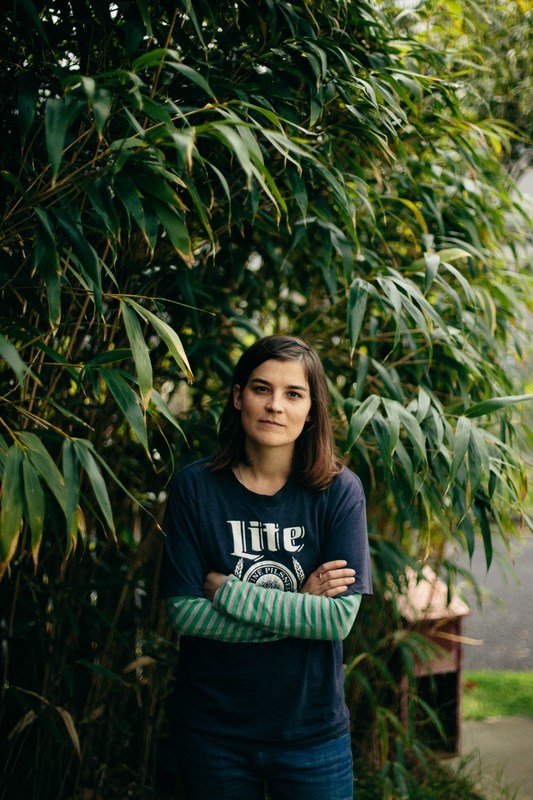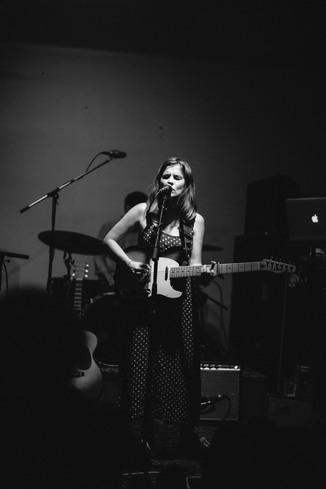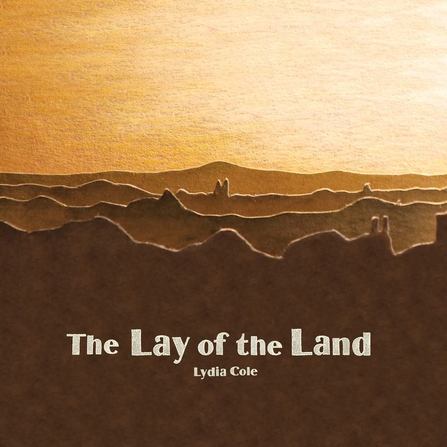With the barman apologising about the poor coffee and refusing to take payment, Lydia and I launched into talking about her history and revisiting her Me and Moon tour with Luke Thompson.
Lydia felt the tour was successful and fun, and that she had “built up a nice sense of momentum” – including selling out a few of the shows and (every musician’s dream) “not going broke.” But after the tour, she felt ready “for something new,” which ended up leading to a few years where she wasn’t involved full time in music.
“I [had become] so focused on music, that it cut out other things… After that tour, I felt like I was no longer trying to do music to prove that I could, or that I was worthy of it. At the same time as that happening, I was growing aware that to have music as my only interest, I was realising how narrow that was making my life. I was only interacting with musicians really.”
So Lydia worked for a few years as a barista, while continuing to play music, which was time to “grow and change.” It also gave her time to reflect and take scope, which she says has made The Lay of the Land more outward focused than Me and Moon.
“Looking back I think [Me and Moon] is me mulling over my heartbreak – me licking my wounds, this is me in my sorrow.”
“I never write for any other reason than to express what I’m feeling, which generally is from a place of overwhelming [emotion]… anxiety, relational anxiety, depression, or loss.”
In between working on Me and Moon and The Lay of the Land, Cole felt like she wanted to try new things in production, and have a shift in sound, and so she worked with a “couple of up-and-coming producers”.
“I did demos with three different people, because I knew I wanted a shift in my sound. I naively thought, if I do something with the same producer, it can’t be any different. But I at least tried, to see if there was someone out there I could work with. I guess broadening my horizons again and seeing what’s out there. Trying to be open, and not always go to the tried and true.”
But Cole felt that the demos weren’t quite working how she would like. She bumped into Me and Moon producer Nic Manders, and after talking about her new material, he voiced his excitement at working on something new, with a different style of production.
“[Nic Manders said] ‘I really want to try something new myself.’ So it sounded like we were in a similar space about it. And I was like, ‘I trust you, we work well together, you get the best out of me in the studio, even when I’m in tears with anxiety. He’s incredible.”
“Nic has a really amazing way with people. I’ve always been aware that he knows how to get the best out of me, on a very delicate and personal level… I’ve seen him in the studio with a band of eight people, all at once… To see him work his magic with eight different people, all at once, is just next-level impressive.”
The gap between albums helped Cole’s quest to find new sounds. “I think that whole three or four, five years [between albums], also opened me up to lots of different kinds of people, who listened to lots of different kinds of music, so no longer was I just listening to Ryan Adams, and like sad, acoustic stuff. Like War on Drugs, more electric stuff… I guess, me just discovering that I appreciate and enjoy a broader pallette of music. What goes in comes out.”
“The message of social media is ‘you need to reach people, you need to impress people, you need to be on the newsfeed every day’… that kind of mentality of content, content, content, all the time. Twelve months a year. It’s just not natural. It’s not how… it works. I feel sorry for any artist out there that’s feeling like ‘every artist is being productive, twenty-four seven, and I’m not, what’s wrong with me?’ Nothing’s wrong with you, it’s just that part of our culture is… insane.”
As a result, Cole says The Lay of the Land is also in a “really different space” thematically too, as she is more “comfortable in [her] own skin”.
“In the old days, I used to be quite a victim. If the bus drove past, I’d think ‘this is me’. Not just in relationships, but it was my whole outlook. My whole world view was kind of skewed that way.”
“I used to freak out heaps in the studio thinking, ‘what’s the right way to do this song? We’ve got to find it, weve got to find the answer.’ Instead of ‘there are a hundred ways to do this song and none of them are wrong. Just have fun, feel the music, and see what happens.’”
“It’s the same in life. I used to have so much relational anxiety, because I was like ‘is this the right one, is this the right guy, is this the one that’s going to last?’ – whereas now I don’t believe there’s a one anymore. I just think you find someone that makes sense to you, and you can build something strong with, and that’s healthy both ways, and that’s your one. I think my outlook on many things has shifted drastically since the last album – music, love, everything.”
The more buoyant, outward focused mood of The Lay of the Land doesn’t mean that the themes are trivial, though. Cole says there are a multitude of meanings behind the album, from those that are quite literal, through to more abstract social and relational themes.
The original idea for the album came from an artwork that Lydia had been working on, culminating in a poem she had written years ago with the lines ‘close to the ground, with two inquisitive hands, which knew the lay of the land’.
“That’s kind of describing me. I’ve always been a pedestrian; I’ve always walked. Like when I pass a nice looking shrub, I’ll touch it. I love feeling really close to the ground and familiar with my surroundings and familiar with them, and connected. So that’s where that lyric came from.”
“Geography has always interested me. So on a very literal level, talking about the land speaks to me a lot. In high school, when I was sitting in the back of all my classes doing poetry, in geography I was still getting Excellence, right up until I dropped out of Seventh form.”
“My parents are big gardeners, and real earthy. I have a real earthy background. So I feel like I’m always observing – always looking out the window, always looking up at the moon, out at the mountains. I’m always observing. And one of the things that, probably the biggest shift in my thinking from more negative to more positive, was moving from Hillcrest on the North Shore, to Kingsland. Hillcrest, where I lived with my parents, is basically at the bottom of a valley. So when you look out of your window, there’s only so far you can see. And I always felt a bit like I was suffocating a bit. I never realised that until I moved to Kingsland, which is pretty much up on a ridge.”
From her new vantage point in Kingsland, Lydia is able to stand on a chair in her room and see spaces throughout the city. “I look out my bedroom now, and I see the valley from the elevated space. And I look across to the ridge of Grey Lynn, and I look west and I can see the ranges. That’s enormous scope. And I look back east and I can see the Sky Tower. Honestly, that has shifted my thinking.”
“I was talking recently to my grandma, and she was talking about her house, because she’s in the process of moving, and she was saying the one thing she hasn’t loved about the house she has lived in for fifty years, is that it’s down in the bush. She just wants to be elevated. Maybe I’m reading into it, and maybe every person feels better elevated physically. Anyway, I found that really fascinating. And that’s just one thing that really struck me when I moved to Kingsland – like ‘why do I feel so much better?’ I guess that got me thinking about stuff.”
The Lay of the Land is also about recognising how everyone observes things differently from the next person. “We all have our biases so it’s really impossible for any of us to look at any issue or reality and see it for exactly what it is. We’re only human. Even with a mountain. You can measure it around all the sides – you can measure it from bottom to top, you can describe it in measurable ways. But me standing here looking at a mountain, it looks totally different from how you’ll see it from the other side. It’s one mountain but it looks totally different to two different people.”
“I’ve been wrestling with reality, perspective and bias. It’s so far-reaching. It’s within myself; part of it is coming to terms with my emotional side, which is pretty much all of me, and which is extremely powerful, and amazing in horrible ways”.
 Photo Credit Josh Yong
Photo Credit Josh Yong
“‘Hurt the earth, bite the hand’ [from ‘Telepathise’] … it boggles my mind in general how we treat the earth. Like mining, logging, just all of the countless disgusting ways we treat the planet. I think everything is connected, and I just don’t understand how… I think that is one of the biggest shames in the world at the moment. In general, I don’t think people are seeing that way. I don’t think people are seeing how things are connected. They can see a symptom of something and not connect it with something, where it came from. The way we’re treating the planet is that we’re biting the hand that feeds us. If we don’t look after the planet we’re all gone. We’re all gone. All of us. It won’t matter who’s rich, who’s poor, who cares and who doesn’t.”
“It’s crazy, I just don’t understand how people can’t care about the environment.
Like I think it used to be a niche thing to care about the environment. I don’t think we can afford for it to be a niche interest, or for extremists to care about. It’s for everyone. It affects everyone. And if we don’t think like that, we’re blind.”
The song also touches on faith and God. “I don’t really think any religion has dibs on truth, and how it will flow in people, you know? No one prediction or explanation or understanding of God and his invisible love and power can explain it all… I think this whole thing of of a religion having to have all the answers, having to argue for itself and explain everything is actually not the point of spirituality.”
In between drinks of beer (just the one), we also talked about Lydia’s time without alcohol, and how stepping away from drinking helped her “gain perspective” on things, which culminated in the story in ‘Sober’.
“I realised that drinking lots of alcohol wasn’t serving me anymore. Basically my behaviour with and around alcohol was becoming destructive. So it’s important to be self-aware, and see things for how they are, and say ‘look, I can see patterns emerging – that’s the lay of the land, this is what I’m dealing with, this is who I am, this is my behaviour.”
But behaviour doesn’t always stay the same, either. “You think of mountains as unchangeable – like that’s what Rangitoto looks like, that’s what it is always going to look like, but that’s just from your point of view at this point in time; that is not how Rangitoto always looked like, and it’s not how it’s always going to look like. And your behaviour with that thing, influences it. So if I walk up and down Rangitoto, the same track every day, for sixty years, I’m going to wear a track into the mountain. So someone’s behaviour, or what you’re doing, makes an impact on the reality of how things are.”
“It’s been a really big journey for me over the last few years, realising that there are things about myself that I see as massive weaknesses, massive character gaps or personality flaws and stuff. And I used to get really depressed, anxious. My ability to think and go, ‘how can I change that stuff?’ a day at a time, chipping away at it, I can change anything about myself.”
For long-time listeners, the album isn’t a complete shift from Me and Moon. Songs such as ‘Dream’, which is about an ex who “disappeared and went back to the country whence he came”, have closer links to her debut album, while ‘Time is a healer’ is about waiting patiently for love.
“[‘Time is a healer’ is] about how I can see that I’m not ready to be with someone right now. But it’s coming. And I can see where I am. I’m in a place where I’m learning about myself, about the world, I’m growing, I’m becoming a stronger person. I’m in the process of finding that person, but they’re not coming right now. And that time, like I’m not going to worry about being single. I’m just going to embrace the process, and enjoy becoming ready. Rather than obsessing over being ready.”
‘The Fool that I am’ also shows Lydia wearing her “heart out on her sleeve” about not being judgmental. “It’s basically saying ‘I know I’m not perfect… I’m actually doing my best’. I’m very self aware, and if someone respected came to me and said ‘hey, I’m really concerned about this’ or ‘can you talk to me about how you’ve been a bit like this lately’ and I would give them the time of day. But they have to have that position in my life, and they have to be speaking in love for it to work.”
Speaking of love, Lydia Cole is about to embark on a new chapter, as she is leaving New Zealand for Berlin, where her boyfriend lives – though we don’t dwell long on the subject: “haha… in the past I used to love talking about my relationships and now…” she says, with a smile, letting the sentence drift off.
With a twist of fortune, she had already decided to move to Berlin before meeting him. “When I met him it was the final straw. Haha.”
And with that, we left so Lydia could brew some decent coffee.
(FRASER BROWNE)
Lydia’s hometown show at The Vic, Devonport is sold out this Friday night, however keep your eye out on the Facebook event in case people try to get rid of their tickets! Fraser and I hope to see you there, it’s going to be a beautiful show, and the last in NZ for a long while – Finn.

